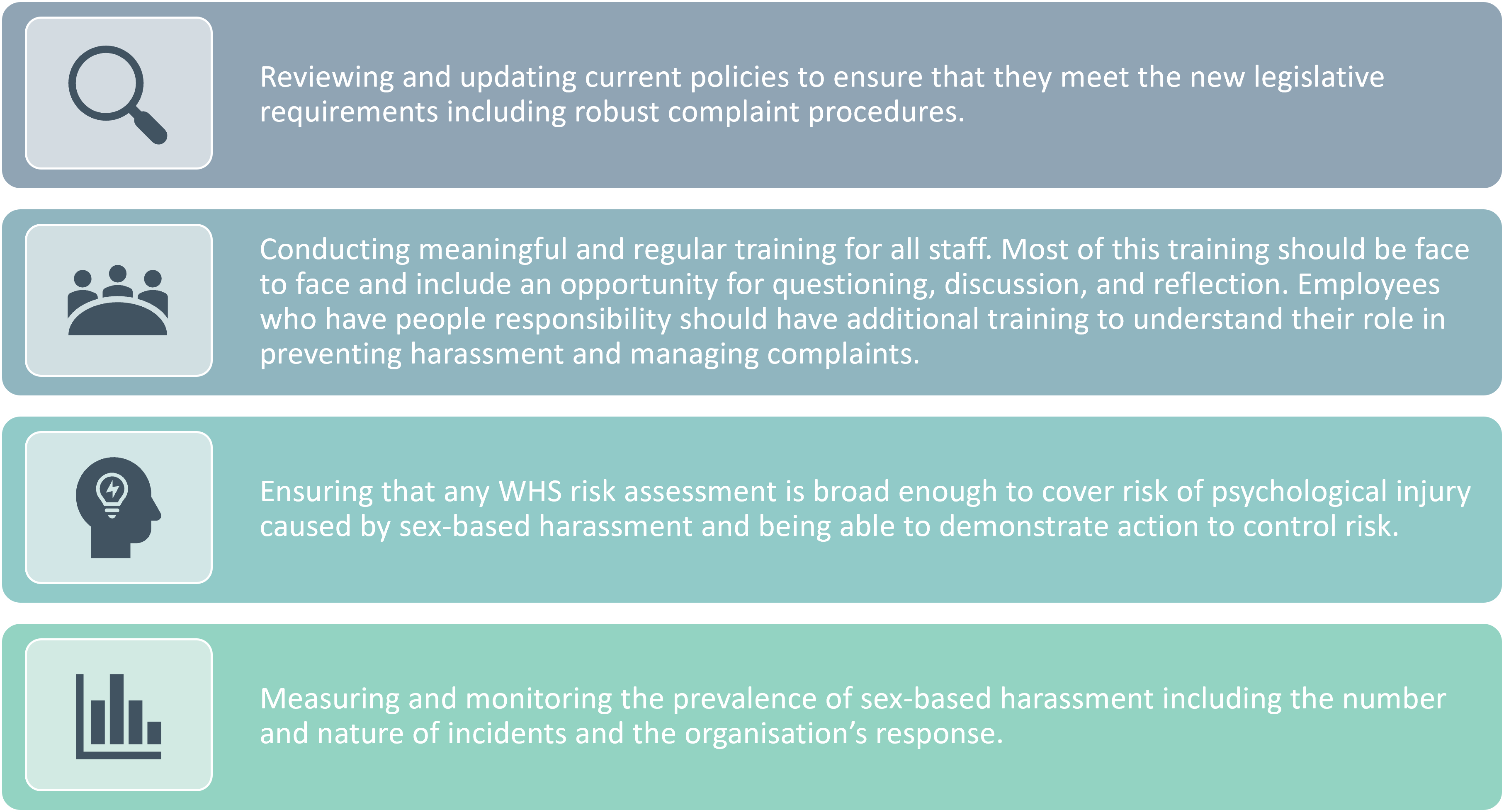
Respect@Work | Four steps to prioritise in 2023
Respect@Work
Supporting your business through the legislative changes
Most of our clients would be aware that the Anti-Discrimination and Human Rights Legislation Amendment (Respect at Work) Bill 2022 (“the Bill”) passed both Houses of Parliament on 28 November 2022. The Bill was given Royal Assent on 12 December 2022. The legislation enacts several of the recommendations from the Australian Human Rights Commission’s 2020 Respect@Work Report (the “Jenkins Report”). The most significant and over-arching change is the shift in focus of the law.
Previously, the law primarily focussed on dealing with harassing or discriminatory conduct. The shift has moved the focus towards preventing this type of conduct from occurring in the first place.
Although the content of the amended legislation has been widely communicated, the volume of information available on this topic can be overwhelming. Many of our clients might be wondering where to begin in terms of practical implementation, particularly for organisations that do not have specialist internal expertise in this space.
This article will briefly summarise the most significant amendments to the legislation and recommend four steps that employers of all sizes should prioritise in 2023.
Supporting your business through the legislative changes
Most of our clients would be aware that the Anti-Discrimination and Human Rights Legislation Amendment (Respect at Work) Bill 2022 (“the Bill”) passed both Houses of Parliament on 28 November 2022. The Bill was given Royal Assent on 12 December 2022. The legislation enacts several of the recommendations from the Australian Human Rights Commission’s 2020 Respect@Work Report (the “Jenkins Report”). The most significant and over-arching change is the shift in focus of the law.
Previously, the law primarily focussed on dealing with harassing or discriminatory conduct. The shift has moved the focus towards preventing this type of conduct from occurring in the first place.
Although the content of the amended legislation has been widely communicated, the volume of information available on this topic can be overwhelming. Many of our clients might be wondering where to begin in terms of practical implementation, particularly for organisations that do not have specialist internal expertise in this space.
This article will briefly summarise the most significant amendments to the legislation and recommend four steps that employers of all sizes should prioritise in 2023.
Respect@Work | Summary
The key changes to the legislation are as follows:
A Positive Duty to prevent sexual harassment in the workplace (Positive Duty)
Employers and Persons Conducting a Business or Undertaking are required to take “reasonable and proportionate measures” to eliminate unlawful sex discrimination, including sexual harassment, victimisation, and hostile work environments so far as possible.
The “reasonable and proportionate” measures will take account of matters such as the size, nature, and resources of the business or undertaking, as well as the practicability and cost of eliminating the conduct. These will vary depending on the size and resources of the organisation.
The Positive Duty is similar to the positive obligations imposed by Work Health and Safety legislation.
____
Hostile working environments
Another new provision prohibits conduct that subjects another person to a workplace environment that is hostile on the ground of sex.
A person subjects another person to a workplace environment that is hostile on the ground of sex if a reasonable person, having regard to all the circumstances, would have anticipated the possibility of the conduct resulting in the workplace being offensive, intimidating or humiliating to a person by reason of the sex of the person.
The circumstances to be considered when determining whether the conduct is unlawful include: the seriousness of the conduct, whether the conduct was continuous or repetitive, the role, influence or authority of the person engaging in the conduct, and any other relevant circumstance.
____
Changes to the powers and functions of the Australian Human Rights Commission
The Australian Human Rights Commission (AHRC) will be empowered to promote and enforce the Positive Duty.
These powers include:
- publishing guidelines, promoting public understanding, and undertaking research in relation to the Positive Duty
- making inquiries into, and issue compliance notices in relation to a person’s compliance with the Positive Duty
- applying to the Federal Court for an order directing a person to comply with a compliance notice in relation to the Positive Duty.
The expansion of the AHRC’s powers do not commence until 12 December 2023.
How will this impact your business?
The Respect@Work website has a wealth of information for individuals and employers including a “Good Practice Indicators Framework for Preventing and Responding to Workplace Sexual Harassment”.
There are seven domains in the framework for workplaces to address sexual harassment:
- Four domains for prevention – leadership, risk assessment and transparency, culture and knowledge; and
- Three for response – support, reporting and measuring.
This recognises that a more holistic approach is necessary that looks beyond compliance. There are numerous tools and processes that can be utilised to measure and improve organisational leadership and organisational culture. We look forward to sharing our innovative ways for diagnosing and customising action plans for our clients in this space.
Immediate Action
As mentioned earlier, all businesses should consider four focus areas for priority action in 2023.

How can Mapien support your business?
Mapien has a wealth of experience in this space from assisting our clients with policy review and development, preparing and delivery of tailored training workshops and undertaking workplace and culture reviews which can provide vital information about risk.
To learn more about how we can support your business through these changes, talk to your Mapien Consultant or contact one of our experts below.

